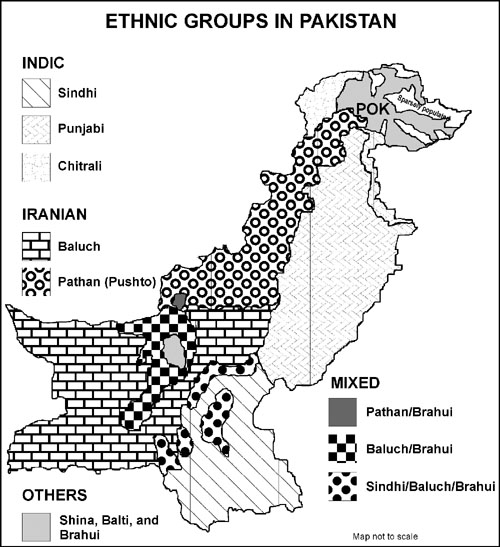What are the similarities between India and Pakistan, which Indian peaceniks go on about? Other than ethnicity, food and to a lesser extent language, squat all. The two countries are on different political, cultural and economic trajectories. Since 1971, Pakistan has strived to reinvent itself as an Arab state, in order to draw the wider Islamic world into its fight against India. Wahabbi madrassas funded by Saudi petrodollars have metastasized across the country like a rampaging cancer. These madrassas stress the need for Pakistani society to regress back to the 7th century and the fundamentals of Islam (as interpreted by the Wahabbis only). They advocate medievalism over modernity. Liberal Sufi and Barelvi traditions are being replaced by religious orthodoxy that would be unrecognizable to anyone who lived in pre-partition India, when there was no Pakistani army and no Lashkar-e-Toiba. How can any peace process be durable unless Pakistani civil society first frees itself from these two terrorist groups (one in uniform, the other outside it)?
Economically, Pakistan has been a basket case since the mid 1990s. The country is dependent on foreign aid to make up for the financial deficits caused by its ever-expanding public sector i.e., the Pakistan army’s business empire. Land-grabbing by army officers is institutionalized in the form of grants awarded by generals to their favourite subordinates. A neo-colonial system of economic predation combined with a population explosion is pushing Pakistan back to the 18th century, while the Indian economy continues to liberalize and grow. Despite having a population seven times larger than its neighbour, India’s per capita income grew to exceed that of Pakistan in 2003 and the gap has since widened. From a purely business perspective, the argument for better relations with Pakistan simply does not make sense. Even the European Union is facing problems due to income disparities among its constituent states.
The Pakistani state today shares more in common with fascist dictatorships of yesteryears than with democratic India, yet Indian peace activists stress the similarity between the two peoples.
Why then, are some Indian journalists so keen to jump on the peace-making bandwagon, especially when Mumbai has eclipsed Kashmir as the ‘unresolved issue’ in Indo-Pak relations? Are they genuinely unable to differentiate between the tasks of reporting facts, formulating policy and providing light amusement? The ‘Aman ki Asha’ initiative by the Times of India and Jang media groups fails miserably on the first count, with its lack of empirical evidence and logical argument and resort to clichés like ‘turning swords into ploughshares’. As regards influencing policy, flowery language is insufficient to dissuade Pakistan from supporting terrorist groups, as successive Indian prime ministers have learnt. All that the proposed peace initiative does is provide an example of the wordplay that appeasers engage in when they run out of arguments and have to keep talking.
Were it not for the insult which the authors of this initiative deliver to the memory of 70,000 Indians killed by Pak-sponsored terrorism in Punjab, Kashmir and elsewhere, their delusions would be laughable. Not only have they allowed themselves to be wined and dined into serving as ISI mouthpieces, but they also perniciously suggest that their views are shared by a majority of people. In the process, they forget that with each successive terrorist attack in India, a growing number of people have legitimate cause to hate Pakistan and all that it stands for. From the Akshardham Temple siege in 2002 to Mumbai in 2008, victims of the dead and injured lost any reason to support peace initiatives with a terrorist state. The same holds true for families of soldiers who died reclaiming the heights of Kargil. While harping about Pakistani hospitality, Indian peace activists could pause to consider the hospitality shown to Lt Saurav Kalia and his men for fifteen days in May 1999. Lest anyone argue that the actions of a few crazed jihadis do not represent the majority of Pakistanis, it must not be forgotten that their savagely mutilated bodies were returned to India by the Pakistan army, not Lashkar-e-Toiba.
Evidence of such intellectual subversion already exists, in the form of arguments that a “™stable and prosperous Pakistan is in Indias interest. Which Pakistan are these people talking about?
There is a concerted effort on by interested third parties to create an impression that resumption of the peace process is ‘inevitable’. It is not. Even the most pacifist of Indian prime ministers have demonstrated a steely resolve on national security issues, such as V.P Singh in 1990 when he threatened to go to war if Pakistan intervened overtly in Kashmir. Similarly, in 1997 IK Gujral did not allow his dovish image to stop him from publicly shooting down a British attempt to mediate on Kashmir. Those who believe that New Delhi can be flattered or badgered into negotiating with a terrorist state only risk damaging their own relations with India. During the first few weeks of the Kargil war, there were the usual calls for restraint from Washington and London. These transformed into pressure on Pakistan only after India made clear that it would not negotiate under threat. Today, a similar message of firmness needs to be sent out.






There is annual growth in peace in India anyways. We do not want to involve with Pak now and disrupt their downfall. Let us steadily grow and ignore them. They anyways would harm eachother and the elites will flee their country. We should rather keep policies and protocols in place to keep the radical immigrants out in-case of a possible disintegration of Pakistan burdening all Indians.
We support the peacefull practice and humanity.
We defence lands and civilizations.
We’re adding our peacefull wishes to yours.India
We defence the higher culture.We’ll never break out.